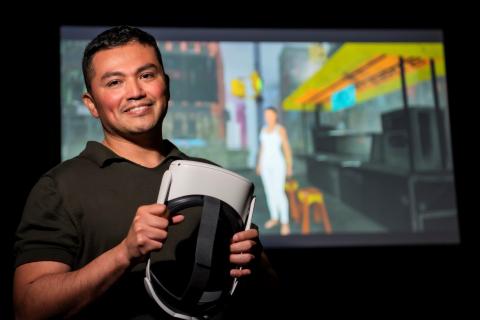
If you think the 3D blockbuster Avatar: The Way of Water is impressive, stand by for Embodied Virtual Reality. EVR is set to change the way we watch movies.
These films use video game technology and visual effects animation to create fully immersive experiences that make audiences feel like they’re part of the action.
EVR films are viewed on Virtual Reality headsets and incorporate touch simulations and spatial sounds that appear to come from different directions.
In the future it is expected they will bring smell and temperature changes into the experience – and by monitoring viewers’ vital signs, VR equipment could use AI to change a film’s storyline in real-time to fit personal preferences.
Filmmaker Rudy Carpio became interested in EVR while researching VR for the plot of one of his traditional films.
The Bond University student has embarked on a PhD on EVR films which are produced using the same technology as virtual reality games.
That research has spawned guidelines to help filmmakers create compelling EVR films, and a his own EVR series, Gala.
“Breaking into (traditional) filmmaking is costly and extremely difficult but EVR films are still in their infancy and I saw an opportunity to open up a door,” said Mr Carpio, who is finalising his thesis.
“I did this not only for me, but for all independent filmmakers to show them, ‘Look, you can do this, you don't need to wait for funding to be able to produce a great story’.”
It is estimated there are more than 171 million VR users around the world and the VR market is expected to reach US$26.9 billion in value by 2027, up from US$7.72 billion today.
Oops, something went wrong.
In his research, Mr Carpio analysed four popular EVR films - Bonfire, Wolves in the Walls, The Line and The Key - that between them have collected Emmy awards and featured at top film festivals.
From this he produced a detailed guide for EVR filmmakers which, boiled down, emphasises the importance of focusing on the audience and making them part of the story rather than a passive viewer.
“There are a lot of virtual reality films where the viewer can move around in the film but they are not allowed to interact with the story or the characters,” Mr Carpio said.
“Making the audience part of the story and also making it interactive – those are the key points of making a good EVR film.”
James Birt is a co-author of the study and Associate Professor of Film, Screen and Creative Media at Bond University.
Dr Birt said the guidelines, combined with the federal government’s newly announced national cultural policy, could turbocharge Australia’s fledgling Australian EVR film industry.
“You've got millions of VR headsets around the world already, so you have an audience that is craving content that is not necessarily games,” he said.
Mr Carpio hopes to release his EVR series Gala in 2024 and have it available for download to leading VR headsets such as Meta Quest 2 and Sony PlayStation VR.
The series follows Gala, a human-jellyfish hybrid living in a city racked by climate change.